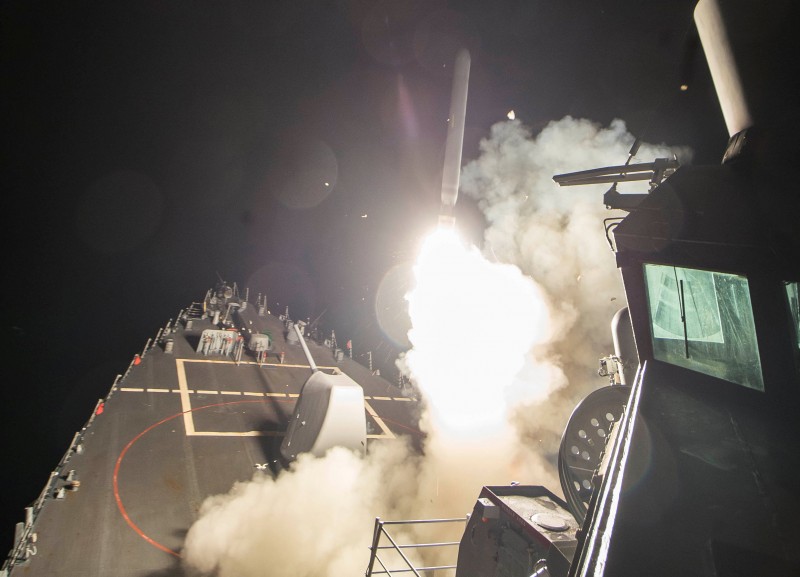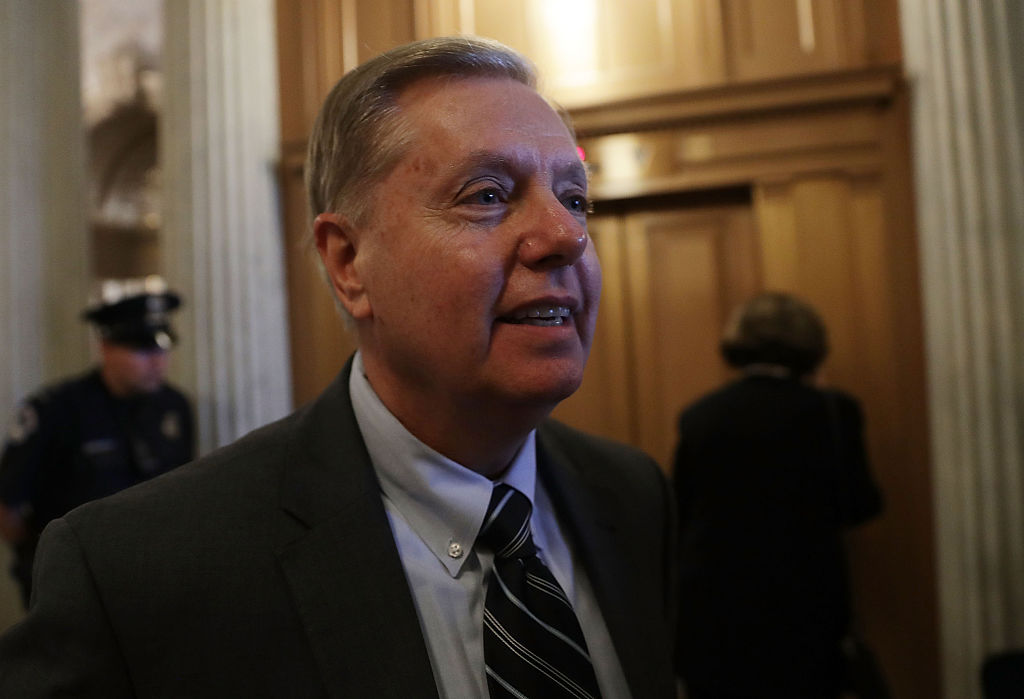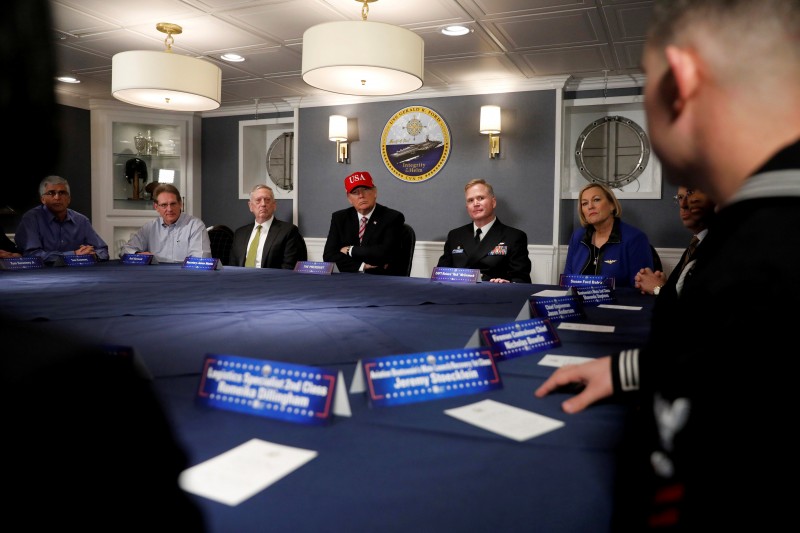President Trump said George Bush lied about WMDs in Iraq and pledged to enact an “America First” foreign policy stance. In his first 100 days in office, however, Trump has won some adoration from foreign policy hawks.
The Trump administration dropped the “Mother of All Bombs” on ISIS targets, launched an airstrike on a Syrian airfield, and started military preparations in case the situation in North Korea escalates to war. UN ambassador Nikki Haley has said there won’t be peace in Syria with “Assad as the head of the Syrian government,” and President Trump said NATO is no longer “obsolete.”
These actions and words seem to be a departure from the vision Trump laid out in his inaugural address.
“We will seek friendship and goodwill with the nations of the world – but we do so with the understanding that it is the right of all nations to put their own interests first,” Trump said. “We do not seek to impose our way of life on anyone, but rather to let it shine as an example for everyone to follow.”
Since this address, Trump has won over some unlikely allies.
Paul Wolfowitz has been described as the architect of the Iraq War and during the campaign supported Hillary Clinton. However, in a recent interview with Politico, the former Bush administration official said he has been constant contact with both Secretary of Defense Jim Mattis and National Security Adviser H.R. McMaster. Wolfowitz went on to say that he saw an opportunity after Trump struck Syria.

U.S. Navy guided-missile destroyer USS Ross (DDG 71) fires a tomahawk land attack missile in Mediterranean Sea which U.S. Defense Department said was a part of cruise missile strike against Syria on April 7, 2017. Robert S. Price/Courtesy U.S. Navy/Handout via REUTERS
“If nothing is done to follow up on it, it will start to seem a little bit silly in retrospect; certainly the enthusiasm will seem silly,” Wolfowitz said. He said that Trump is flexible and seems to listen intently to both Mattis and McMaster.
A recent report from Bloomberg’s Eli Lake said McMaster is open to deploying thousands of additional ground troops in Syria. The Pentagon refuses to say how many troops are deployed in Syria, months after sending a few hundred there.
Another former Bush official Elliott Abrams recently spoke with Politico for a story that found him “queasy about Trump’s quasi-isolationist ‘America First’ shtick during the campaign,” but “impressed by the administration’s about-face.” The president reportedly rejected Tillerson’s proposal of nominating Abrams to deputy secretary of state in February due to the hawk’s harsh criticism of the future president during the campaign.
Trump also won the praise of both Senators Lindsey Graham and John McCain after his strike on Syria. During the campaign, both severely criticized Trump’s foreign policy. On Monday, the two ended up having dinner with the president. A source with knowledge of the situation told The Daily Caller that the president “gloated” to Sen. Graham about his strike on Syria the night it happened.

Lindsey Graham speaks to members of the media at the Capitol on September 28, 2016 (Getty Images)
In addition to the praise, a Trump critic and former Bush official landed a key State Department role and Trump reportedly is considering bringing on two former McCain aides. A State Department official who was a Trump political appointee previously told TheDC, “I’m so disappointed about all the neoconservatives trickling into the administration.”
Allies of Trump have had a mixed reception to all of this.
Conservative commentators Laura Ingraham, Ann Coulter and Pat Buchanan were all upset about the strike on Syria.
“If voters wanted more Middle Eastern wars, there were plenty of other candidates offering that: Marco Rubio, Lindsey Graham, Carly Fiorina, and Hillary Clinton, for example. And we must never forget Jeb! though it proved surprisingly easy to do so in 2016. But we picked Trump,” Coulter wrote in a column.
Buchanan, a long time anti-interventionist, has been particularly critical of Trump’s foreign policy. His most recent column was titled: “War Cries Drown Out ‘America First'” “The promise of a Trump presidency — that we would start looking out for our own country and own national interests first and let the rest of the world solve, or fail to solve, its own problems — appears, not 100 days in, to have been a mirage,” Buchanan wrote.
While other Trump supporters are not nearly as pessimistic. Michael Anton, a White House staffer who wrote columns supportive of the president during the campaign, insisted in a recent interview that Trump hasn’t abandoned the ideology that propelled him to victory.
“He made it plain that he was willing to use U.S. military power in instances when he thought it was in the national interest. And this is an instance in which he determined it was in the national interest,” Anton told Politico. “So, the people who think that this was some-either a pleasant, or a disastrous surprise, I leave pleasant or disastrous to their own interpretation, but surprise, I have to say, is maybe a matter of fact, and it didn’t surprise me.”

FILE PHOTO – U.S. President Donald Trump (C, in red hat) and Defense Secretary James Mattis (3rd L) receive a briefing with Commanding Officer U.S. Navy Captain Rick McCormack (2nd R) and Susan Ford Bales (R) aboard the pre-commissioned U.S. Navy aircraft carrier Gerald R. Ford at Huntington Ingalls Newport News Shipbuilding facilities in Newport News, Virginia, U.S. on March 2, 2017. REUTERS/Jonathan Ernst/File Photo
Former Trump adviser Sam Nunberg told TheDC that he has been happy with Trump’s foreign policy so far and compared the president to a Rorschach test. “You’re going to have ten people in a room and 50 reasons for why they support Trump,” Nunberg said. “I think people misunderstood his foreign policy.”
The president did indeed call himself “militaristic” during the campaign, said he would “bomb the shit” out of ISIS, and that there is a “maniac” in charge of North Korea that the U.S. should focus on.
Trump confidante Roger Stone seems to sit in the middle of these two camps. He told MSNBC’s Chuck Todd the strike on Syria to him was not a “violation of Trumpism,” but it would be if it “extends itself to a broad boots on the ground conflict.”
The president told the Associated Press last week that defeating ISIS is his administration’s goal and that there could multiple increases in troop deployments, but “not much.”


